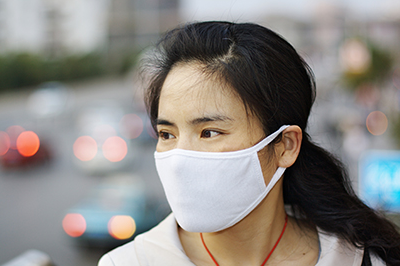
Is Pollution Contributing to Your Acne

You probably never thought that the air around us might contribute to blemishes—but dermatologists and researchers have started pointing fingers at pollution as a potential cause of acne.
Is Pollution Contributing to Your Acne?
We all know that acne breakouts happen when the pores become clogged with bacteria and dead skin cells, and we also know that environmental factors and certain habits can make acne worse. But you probably never thought that the air around us might contribute to blemishes as well—and dermatologists and researchers have started pointing fingers at pollution as a potential cause of many skin concerns, including acne.

What we know about acne and pollution
Air pollution includes ozone (O3), chemicals and microscopic particles that are small enough to accumulate in the pores. Several studies have looked at the effects living in a high-pollution environment can have on the skin, and here are some of the most recent findings:
Caucasian and Asian women tend to experience acne at a similar rate (24% and 30% respectively), yet Asian women (who may be subjected to higher levels of pollution) are more likely to experience inflammatory acne rather than just blackheads and whiteheads.
In a survey of dermatologists, 67% personally believe exposure to pollution makes acne worse.
[an-columns action="end column"] [an-columns action="end columns"]Two separate studies conducted in Mexico City and Shanghai (cities with high levels of air pollution) found that skin quality changes with long-term exposure to pollution. These changes have been shown to be linked to increased oil production, which is a key contributor to acne.
When combined with sun exposure, ground-level ozone (O3) depletes the skin’s natural antioxidants and leads to an increase in inflammation, which plays a role in acne as well.
A Chinese study found that times of increased air pollution concentration corresponded with an increased number of patients scheduling doctors’ appointments for acne.
In a Chinese study of 62 subjects with acne, elevated concentrations of three specific components of air pollution were associated with increased oil production and more acne blemishes.

Research hasn’t uncovered specific ways to minimize acne breakouts in high-pollution environments just yet, but these general skincare recommendations apply to anyone who experiences acne, regardless of where they live—and just might help minimize the effect pollution has on acne.
Use moisturizer and sunscreen to help provide a barrier that protects the skin from pollution.
Don’t pick pimples (as some studies have shown that pollution may increase the formation of dark spots after a blemish has healed).
[an-columns action="end column"] [an-columns action="end columns"]u do to prevent pollution from making acne worse?Cleanse well, especially at night before going to bed.
Look for non-comedogenic skincare products with a lightweight texture for additional moisture while minimizing oil and shine.
SOURCE:
Krutmann, J., Moyal, D., Liu, W., Kandahari, S., Lee, G. S., Nopadon, N., Xiang, L. F., … Seité, S. (2017). Pollution and acne: is there a link?. Clinical, cosmetic and investigational dermatology, 10, 199-204. doi:10.2147/CCID.S131323
Products
View all

